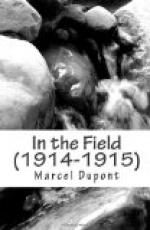In the few seconds we spent below that deserted house in the little trampled garden-close, under the rain of bullets that was falling around us, one dread oppressed us, and lay so heavy on our hearts that it made us dumb and incapable of exchanging our thoughts, or, rather, the one thought that haunted us all. “What has become of the second squadron? What has become of our Colonel, who had stayed in command? What has become of all our dear fellows there on the other side of the wood?” Uncertainty is indeed the worst of all miseries, because it makes its victims believe and imagine every horror.
From our post we could see at the windows and doors of the little houses scattered among the fields the anxious and inquiring faces of our men. They, too, were tortured by uncertainty. They stood huddled together, looking in our direction, waiting for a sign or an order.
Suddenly our doubts were dissipated.
“To arms!” cried our Major, in a ringing voice that echoed above the crackling of the bullets and was heard by the whole squadron.
He had no need to repeat the order. In the twinkling of an eye my troop had formed behind me, in squads. My men waited in absolute silence, their eyes fixed upon me, kneeling on one knee, and leaning on their rifles. I seemed to hear all their hearts beating in unison with mine; and knew their wills ready to second mine.
The Major gave the word of command. We disposed our men in skirmishing order in the ditch of the road that passed in front of our farm, parallel with the skirts of the wood. Our squadrons thus formed a line of from 300 to 400 yards, capable of holding the enemy in check for some time, if they had succeeded in taking our trenches and were already pushing through the thicket. Kneeling on the road behind them, I looked at my men. They were lying flat on the ground on the slope of the ditch; they had loaded their rifles, and I could not distinguish the slightest trace of fear or even of emotion in any one of them.
They were all looking straight before them trying to see whether some helmeted soldier were emerging from the bushes in the gathering shadow. What splendid soldiers the war has fashioned for us! They are no longer merely the diligent and conscientious cavalrymen we took pleasure in commanding, and whose smartness we admired in peace time. The stern experience of the battlefield has hardened, strengthened and ennobled them. Their faces are manlier; their discipline, far from relaxing, has become more thorough; their courage has developed, and, in most of them, now verges on temerity.
I have had two new men in my troop for a short time: Ladoucette and Roger. They are Territorials, men of from thirty-eight to forty, who, wearying of the depot and envying their juniors in the field, asked and obtained leave to rejoin the regiment at the Front. They fascinated me at once by their high spirits, their jovial chaff, and the cheerfulness with which they undertook the most laborious tasks. But I had not yet seen them under fire.




